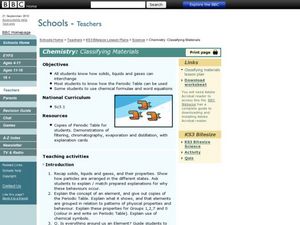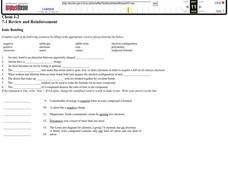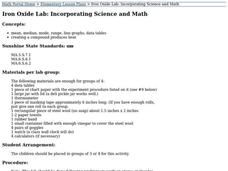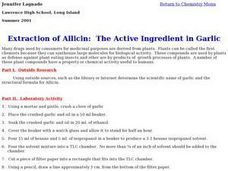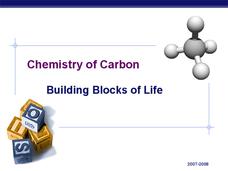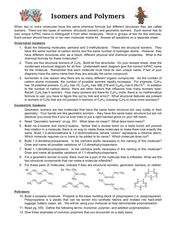Curated OER
Identifying Reaction Types
In this reactions worksheet, learners are given nine chemical reactions to identify as single replacement, double replacement, synthesis or decomposition reactions.
Curated OER
Oxidation/Reduction Reactions
In this chemical reactions worksheet, students review the oxidation number rules and then assign oxidation numbers to atoms in given compounds. Students identify the reducing agent and the oxidizing agent in reactions. Students practice...
Curated OER
Identifying Types of Acids and Bases
In this acid and base worksheet, students fill in a table that gives the molecular name or formula of a compound. They must determine what type of acid or base it is and what the symbol used in the chemical calculations will be.
Curated OER
Organic Chemistry Worksheet
In this organic molecules worksheet, students classify organic compounds, they name organic compounds using the IUPAC naming system, they complete chemical reactions of organic compounds, and they draw structural formulas of isomers.
Curated OER
Food or Fuel?
Students describe the process of transesterification utilizing chemical formulas. They construct and compare models of chemical structure of the substances involved in biodiesel production such as: alcohols, alkenes, alkanes, alkyls,...
Curated OER
Ketones and Aldehydes Practice Sheet
In this ketones and aldehydes worksheet, students name four compounds given their structures, they write the formulas for four compounds, they draw the structures given four compound names and they complete five chemical reactions.
Curated OER
Chemistry: Classifying Materials
Students classify materials. In this chemistry instructional activity, students examine the properties of solids, liquids, and gases. Students discover the elements, compounds, and chemical symbols.
Curated OER
Oil Embargo!
Ninth graders generate and analyze data to determine which and how much of two polymers best absorb oils, formulate procedure to accurately determine how many times its own weight particular polymer can absorb, and develop understanding...
Curated OER
Ionic Bonding
In this ionic bonding worksheet, students review the characteristics of ionic bonding, draw Lewis dot diagrams for elements, and write the chemical formula for ionic compounds. This worksheet has 8 drawings, 14 fill in the blank, and 6...
Curated OER
Iron Oxide Lab: Incorporating Math and Science
Students conduct an experiment in small groups, draw conclusions about the amount heat of a compound achieves and practice their data analysis skills.
Curated OER
Displacement Reactions and Acid/Base Reactions
In this chemical reactions worksheet, students review the solubility rules for common salts. Students determine the molecular equation, ionic equation, and net ionic equation for specific reactions. Students calculate moles and volume...
Curated OER
A Solution for Precipitation
Young scholars predict the product of chemical reaction using the solubility rules. In this chemistry lesson, students balance ionic equation. They perform a lab to check if their predicted products are correct.
Curated OER
Acid and Base Worksheet
In this acids and bases instructional activity, students apply the Bronsted-Lowry theory of acids and bases to write the products for the given acid-base reactions. This instructional activity has 7 problems to solve.
Curated OER
Extraction of Allicin: The Active Ingredient in Garlic
Students conduct research to determine the structural formula for Allicin, a component of garlic. They participate in a lab to extract Allicin from garlic and complete a set of questions about their work.
Curated OER
Summary of Periodic Trends
This concise collection of images speaks volumes about the trends in the periodic table of elements. Different versions of the periodic table are displayed demonstrating different trends. Teachers' notes are included to assist your...
Royal Society of Chemistry
Acids and Alkalis
Is your acid-base chemistry lesson plan a little ho-hum? Spice things up with puzzles! Young chemists manipulate facts about acids and bases to solve a series of interactive puzzles. The activity combines content knowledge and...
Curated OER
Acids and Bases: Together again!
Students identify principles behind acid-base reactions. They predict factors that may affect an acid-base reaction. Students identify questions and concepts that guide scientific investigations.
Curated OER
Chemistry of Carbon - Building Blocks of Life
A great review of the structure and function of carbon-based molecules important to life, especially with relevance to humans. The chemistry behind the combination of polymers and the breakdown of bonds is covered. Valuable content in...
Virginia Department of Education
Soap, Slime, and Creative Chromatography
Do you think chromatography paper suffers from separation anxiety? Young chemists make soap, slime, silly putty, and experiment with chromatography in this lesson. The material includes clear instructions for each experiment along with...
National Institute of Open Schooling
Occurrence and Extraction of Metals
Steel is a man-made alloy or a mixture of metals. Lesson 18 in this series of 36 focuses on metals and their extraction from Earth. Individuals read about, discuss, and answer questions after learning how people find most metals, the...
Curated OER
Hydrates Worksheet
In this chemistry worksheet, students look for the concepts connected to hydrates and answer the variety of questions given for the assessment.
Curated OER
The Mystery of Christa’s Big Bubble
Learners study effervescence. In this hands-on science lesson, students apply the scientific method as they complete an activity regarding the presence of bubbles in liquids.
Curated OER
Chapter 13 Review, Section 1: Ions in Aqueous Solutions and Colligative Properties
This is an apt assignment for chemistry takers that are studying ionic solutions. Eight questions require problem solving and critical thinking to answer. The first question instructs learners to use a table in the textbook, but you can...
Curated OER
Isomers and Polymers
Students create models of structural isomers, geometric isomers, and polymers. In this chemistry instructional activity, students are given definitions and molecular model kits to create a variety of different isomers and polymers.








